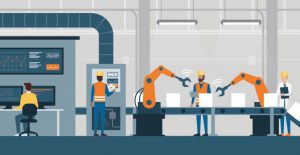The 1st industrial revolution was about mechanizing a laborious process. The second industrial revolution introduced us to electricity, transportation logistics and railroads. The 3rd industrial revolution brought computers into the picture. The 4th Industrial Revolution (Industry 4.0) is all about Digital. Smart Factories equipped with robotics, data analytics, smart sensors, advanced automation, advanced human to machine interfaces, and wearables including augmented reality.
PWC in a recently published study summarized that Industrial companies expect to generate 3.6% p.a. in cost reductions over the next five years, driven by internal improvements and by working more closely across value chains. They’re also expecting to generate 2.9% p.a. in increased revenues by digitizing products and services and developing new digital service offerings, all the way through to hosting platforms for industrial ecosystems.
The question is if the software industry servicing manufacturers has kept up with the new paradigm. I find it hard to believe that the mainstream ERP players who have millions of lines of legacy code embedded everywhere have re-built from the ground up to support the Digital revolution.
Why is this critical? Software has been driving automation for 2 decades now. For a manufacturing company to be relevant, they have to continue to evolve and embrace Industry 4.0 or they will soon be non-competitive. Yet one can argue that a large portion of manufacturers around the world are oblivious to Industry 4.0. Industry 4.0 or the Digital age is about new connections between machines, production processes and systems.
Industry 4.0 calls for a future of agile, affordable manufacturing connecting Internet of Things (IoT), 3D printing, cloud computing, mobile devices and big data. The ERP system will have to become the back-bone that holds everything together connecting smart machines on the factory floor, sensors and quality control as well as guided controls for manually intensive operations.
ERP vendors will have to move away from pre-built interfaces and leverage micro services architecture to give business decision makers the real-time data that’s expected. There will be a large expectation of the ERP system to go beyond and be fully integrated with manufacturing execution systems (MES).
Tracking and tracing every single component from cradle to grave will be necessary in certain industries like pharmaceuticals. Quality assurance will also be greatly enhanced.
The Motherson Group is a Tier 1 OEM supplier; and we can envision a world where each of our components will have an RFID chip for the manufacturing process. This will contain all of the information about the product – that a sensor can read and become a part of the supply chain of the manufacturing process e.g. what color should the bumper be. When the chassis reaches the first workstation in the production line, the RFID chip will send a message to the MES, which will direct the machines to paint the bumper to match. Once complete, the action will be registered on the RFID chip and the car will move onto the next work station. This process can make it possible to customize each car to meet individual customer requirements, whilst maintaining the efficiencies expected of the manufacturing process. This is “Just in time” re-imagined. Our connected systems should allow for last minute changes to production, so manufacturers can respond customers or specification changes as necessary.
The question then is if the current ERP investment can support this new world order?
In our plants, the next generation ERP systems must provide powerful planning functions and incorporate analytics and machine learning so that we can push into intelligent manufacturing. We must look and see how block-chain changes the landscape for us. Will this be a catalyst for change in the manufacturing industry?
It is clear that for a company like us with over 240 manufacturing units in over 37 countries, our ERP system will need to be a driver for growth of our digital factories. If we are saddled with older ERP solutions, we may never be able to morph into a true Industry 4.0 company.
The big change required is how we can reconfigure the shop floor for a lot size of 1. Flexible manufacturing systems is going to be a trend we may have to adopt. The ERP system will need to be able to allow everything to work at the same pace. There will be impact on ERPs with respect to production planning, supplies and logistics based on this. Production Planning is a key area where there is a lot of scope for current systems to improve. Follow us on our journey as we research to find out if any of the post-modern ERPs will cut the mustard.
About the Author:

Team
Motherson Technology Services USA Limited








